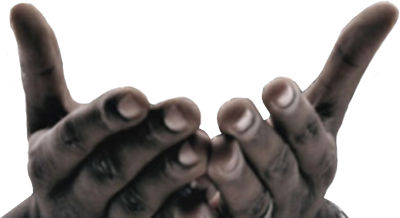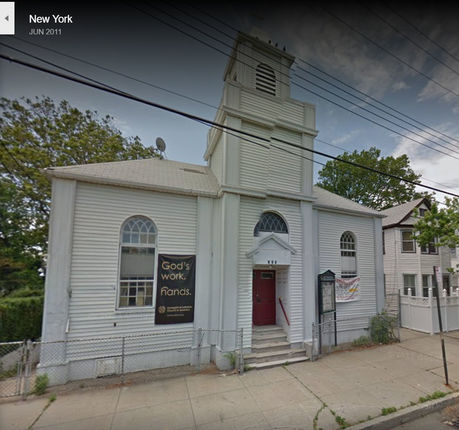My name is John Lunn and I've had the great privilege to be a Lutheran (ELCA) Pastor for the past 29 years - serving in NYC, South Carolina, Hawaii, India, Liberia and Tanzania. Currently, I live and now serve on the Island of Moloka'i. I've served in a homeless shelter, hospice settings, prison, a few different parishes and as a missionary - I have a few stories I'd like to share . . .
Broken for you…Early in my ordained ministry I was assisting a clergy friend in the distribution of Holy Communion in her South Bronx Church. In that congregation, at the age of twelve you would take First Communion classes and then be able to receive communion. A twelve year old girl came for communion. I noticed that she’d been sitting with a younger sister, who was maybe eight or nine years old. When she received the communion wafer, she carefully broke it in half. Half, she put in her mouth; the other half stayed in her hand.
|
|
When she returned to her sister, they were sitting on the first pew, she carefully gave the other half of the wafer to her younger sister. I could almost hear the words being said, “The body of Christ, broken for you.” (Indeed broken, so that it could be shared.) At such a young age, this twelve year old had an understanding of communion that few adults achieve.
I’ve used this story on several occasions. It is one of the most powerful stories of the “real meaning” of communion that I know. One Sunday I used the story in a sermon at my home congregation when I was the guest preacher. Again, I was asked to assist with the distribution of Holy Communion. In this congregation all people come forward and kneel at the altar railing. The over twelve group receiving and the children are blessed. I had communed a mother and blessed her daughter; then I notices that the mother had broken the breading it in two and given half to her daughter. Again, I could almost hear the words being said, “The body of Christ, broken for you.” (Indeed broken, so that it could be shared.) |
An Unexpected Welcoming...
A seminary classmate of mine was getting married in North Carolina. He asked me to perform the ceremony. It was an honor. As a matter of practice, I always ask if the couple wants communion to be a part of the service. This couple said yes. The ceremony took place in the back yard of the couple's house.
After the “I do’s” had been said and the couple was officially married, it was time for communion. I’d asked my friend if he wanted to assist me in distribution. He readily agreed and I asked him to distribute the bread. Many of the couple’s friends were estranged from the church, for many different reasons, and many felt unwelcomed by it. My friend and I walked through the congregation of friends, going to each of them individually. He called them by name and shared with them the bread, “The Body of Christ.” I followed with the chalice of wine offering them “The Blood of Christ.” The attendees felt welcomed and loved as they received communion in a personal and loving manner.
Isn’t that the true purpose of the sacrament? To know that we are welcomed by God, accepted by God and loved by God – with our name.
A seminary classmate of mine was getting married in North Carolina. He asked me to perform the ceremony. It was an honor. As a matter of practice, I always ask if the couple wants communion to be a part of the service. This couple said yes. The ceremony took place in the back yard of the couple's house.
After the “I do’s” had been said and the couple was officially married, it was time for communion. I’d asked my friend if he wanted to assist me in distribution. He readily agreed and I asked him to distribute the bread. Many of the couple’s friends were estranged from the church, for many different reasons, and many felt unwelcomed by it. My friend and I walked through the congregation of friends, going to each of them individually. He called them by name and shared with them the bread, “The Body of Christ.” I followed with the chalice of wine offering them “The Blood of Christ.” The attendees felt welcomed and loved as they received communion in a personal and loving manner.
Isn’t that the true purpose of the sacrament? To know that we are welcomed by God, accepted by God and loved by God – with our name.
The body of Christ…
While serving a United Church of Christ Congregation in Hawaii, I had an unusual experience during communion. It was the job of the Deacon to purchase bread (usually a baguette –French or Italian bread) and prepare the grape juice for communion services. The Deacon this Sunday was a delightful 80+ year old woman who waited until Sunday morning to purchase the bread. She stopped at Big Save on her way to church.
When I picked up the loaf of bread to bless it and then break it, I noticed that it felt a bit oily/greasy. When I looked at the broken loaf, I realized why. It was a loaf of garlic bread – it had been slathered with butter and sprinkled with garlic. It was a Sunday that napkins would have been very helpful.
While serving a United Church of Christ Congregation in Hawaii, I had an unusual experience during communion. It was the job of the Deacon to purchase bread (usually a baguette –French or Italian bread) and prepare the grape juice for communion services. The Deacon this Sunday was a delightful 80+ year old woman who waited until Sunday morning to purchase the bread. She stopped at Big Save on her way to church.
When I picked up the loaf of bread to bless it and then break it, I noticed that it felt a bit oily/greasy. When I looked at the broken loaf, I realized why. It was a loaf of garlic bread – it had been slathered with butter and sprinkled with garlic. It was a Sunday that napkins would have been very helpful.
The blood of Christ…
At this same congregation, if any of the grape juice was left after communion it would be put in a bottle marked “for communion” and frozen. If enough, the Deacon would thaw and use or add some additional juice at the next monthly communion service.
The communion cups were filled from the thawed “for communion” bottle and placed in trays on the communion table. In this United Church of Christ Congregation, the Deacons distribute the individual cups to everyone and then together the cup is drunk. I was a little slow in drinking mine, so I noticed the odd expressions on peoples’ faces after consuming. I particularly noticed one sister/brother pair – the sister took a sip, made a face and handed the rest to her brother to drink. He happily consumed both cups of coffee. Someone had put leftover coffee in the “for communion” bottle. (Me, I prefer tea, thanks!)
At this same congregation, if any of the grape juice was left after communion it would be put in a bottle marked “for communion” and frozen. If enough, the Deacon would thaw and use or add some additional juice at the next monthly communion service.
The communion cups were filled from the thawed “for communion” bottle and placed in trays on the communion table. In this United Church of Christ Congregation, the Deacons distribute the individual cups to everyone and then together the cup is drunk. I was a little slow in drinking mine, so I noticed the odd expressions on peoples’ faces after consuming. I particularly noticed one sister/brother pair – the sister took a sip, made a face and handed the rest to her brother to drink. He happily consumed both cups of coffee. Someone had put leftover coffee in the “for communion” bottle. (Me, I prefer tea, thanks!)

Willing to Withhold?
I find it very difficult to withhold communion from anyone that comes forward and puts out their hands to receive. Should I refuse? Over my many years as a pastor, many hands have been held out like the one-year-old boy wanting to share the same thing that his family was sharing in. During my many years of service as a missionary, some of those who came forward, with hands extended, were probably not Christian. I was not willing to determine whether or not they were answering an invitation to the table, by Christ himself. We must remind ourselves that it is Christ’s table and not ours. We are the servers
Martin Luther understood Christ’s presence in the elements as Real Presence. Christ is in, with and under the elements. We are offered nothing less than Christ himself and the Grace that he imparts in giving of himself. Jesus did not refuse himself to anyone – not the outcaste, not the demon possessed. At the Last Supper he shared the Eucharist – his body and blood - with Judas, who would betray him, with Peter, who would deny him and many of the rest who would abandon him in his darkest hour out of fear. None of them were deserving, yet they received. None of us are deserving either, yet we receive.
I find it very difficult to withhold communion from anyone that comes forward and puts out their hands to receive. Should I refuse? Over my many years as a pastor, many hands have been held out like the one-year-old boy wanting to share the same thing that his family was sharing in. During my many years of service as a missionary, some of those who came forward, with hands extended, were probably not Christian. I was not willing to determine whether or not they were answering an invitation to the table, by Christ himself. We must remind ourselves that it is Christ’s table and not ours. We are the servers
Martin Luther understood Christ’s presence in the elements as Real Presence. Christ is in, with and under the elements. We are offered nothing less than Christ himself and the Grace that he imparts in giving of himself. Jesus did not refuse himself to anyone – not the outcaste, not the demon possessed. At the Last Supper he shared the Eucharist – his body and blood - with Judas, who would betray him, with Peter, who would deny him and many of the rest who would abandon him in his darkest hour out of fear. None of them were deserving, yet they received. None of us are deserving either, yet we receive.

Only in a Hawaiian Shirt
When I was in seminary, my Lutheran Confessions professor (who later became the Bishop that ordained me) and I had many conversations about communion between churches. This was long before our Full Communion agreements. Could I take communion at a Presbyterian Church? Yes, but not in my collar. Same answer for a number of other Protestant congregations. Finally, I asked about communing in a Catholic Church. Yes, he guessed that I could, but definitely not wearing my clerical collar – maybe even only wearing a Hawaiian shirt. His point being that communion was a sign of unity – a sign of common understanding. So public service, where would officially participate, could only happen after such an agreement was reached. I maintained that the only way to come to any kind of unity was to communion together. Only God could unite us.
Many years later I was invited to hear a friend, who was newly a Deacon in the Celtic Catholic Church, preach. The elderly priest celebrating the Mass heard that I was an ordained Lutheran and insisted that I vest and participate in the Mass. The PA system wasn’t working and his was not a strong voice. He asked me to concelebrate the Mass with him, so that the liturgy could be heard. So there I was, in my Hawaiian shirt under a too short Alb and wearing an old stole they found, sharing communion in a Catholic Church. I heard my professor/Bishop’s voice, “Only in a Hawaiian Shirt.”
When I was in seminary, my Lutheran Confessions professor (who later became the Bishop that ordained me) and I had many conversations about communion between churches. This was long before our Full Communion agreements. Could I take communion at a Presbyterian Church? Yes, but not in my collar. Same answer for a number of other Protestant congregations. Finally, I asked about communing in a Catholic Church. Yes, he guessed that I could, but definitely not wearing my clerical collar – maybe even only wearing a Hawaiian shirt. His point being that communion was a sign of unity – a sign of common understanding. So public service, where would officially participate, could only happen after such an agreement was reached. I maintained that the only way to come to any kind of unity was to communion together. Only God could unite us.
Many years later I was invited to hear a friend, who was newly a Deacon in the Celtic Catholic Church, preach. The elderly priest celebrating the Mass heard that I was an ordained Lutheran and insisted that I vest and participate in the Mass. The PA system wasn’t working and his was not a strong voice. He asked me to concelebrate the Mass with him, so that the liturgy could be heard. So there I was, in my Hawaiian shirt under a too short Alb and wearing an old stole they found, sharing communion in a Catholic Church. I heard my professor/Bishop’s voice, “Only in a Hawaiian Shirt.”


